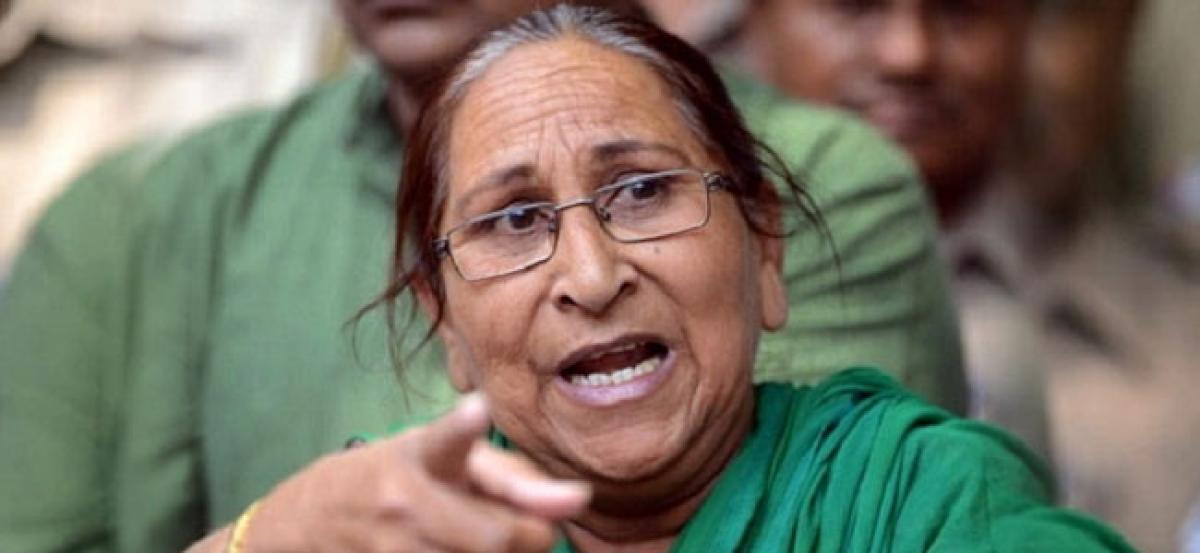Live
- Hyderabad: Police bust burglar gang, arrest four
- Spiritual fervour marks Karthika Pournami
- Give big nudge to solar power production thru SHGs: Bhatti
- VIT-AP celebrates National Library Week
- Experts flag concern over faulty upkeep of tracks, chinks in infra
- Render services for people’s upliftment
- Safe Stay Audit programme for IT and ITES sector launched
- AP CM Chandrababu meets union ministers in Delhi, to visit Mumbai today
- Ponnam warns against negative propaganda of ongoing survey
- Hyderabad: Enumerators jotting down details with pencil nettles families in city
Just In

With the International Court of Justice (ICJ), the primary judicial organ of the United Nations, temporarily staying the death sentence of former Indian Naval officer and alleged Indian spy Kulbhushan
With the International Court of Justice (ICJ), the primary judicial organ of the United Nations, temporarily staying the death sentence of former Indian Naval officer and alleged Indian spy Kulbhushan Jadhav by a Pakistan military court, Dalbir Kaur, the sister of Sarabjit Singh, who died in a Pakistan jail in 2013, on Thursday said Pakistan must learn from its own mistakes.
"Firstly, I want to thank my God. Today, it's a very big victory for India. This is the victory for all Indian citizens, victory for truth. India defeated Pakistan today and Pakistan must learn from its own mistakes. I am very happy to hear this. A very big congratulation to Kulbhushan's family, citizens of India, Prime Minister Narendra Modi, Sushma ji and to Rajnath ji. Pakistan is habitual to face such things. The decision came in our favour because truth always wins," Dalbir Kaur told ANI.
Sarabjit Singh, an Indian national, had been sentenced to death for alleged involvement in a string of bombings in 1990 by a Pakistani Court. He was later on murdered by by his jail inmates at the Kot Lakhpat Jail in 2013. He and his family, notably his sister, Dalbir Kaur had constantly tried to free him through mercy petitions but failed.
Earlier in the day, Justice Ronny Abraham, President of the ICJ read out the much-awaited verdict and asserted that the case was indeed debatable, while also adding that the ICJ had prima facie jurisdiction in the case. Abraham added that under the Vienna Convention, India should have received consular access to seek justice for the former Indian Naval officer. The only condition under which Jadhav now stands to face execution is if Pakistan does not comply with the ICJ's decision. India can then go to the Security Council, which may then decide upon measures to be taken to give effect to the judgement. The UN charter entails that 'each member of the United Nations undertakes to comply with the decision of the International Court of Justice' and 'if any party to a case fails to perform the obligations, the other party may have recourse to the Security Council.'
A Pakistan military court had awarded the death sentence to former Indian naval officer Jadhav on April 10 for alleged 'espionage and subversive activities.' However, India, after being denied consular access for 16th time, dragged Pakistan to the ICJ on May 8 for violating the Vienna Convention. India told the ICJ that immediate steps must be taken to stop Pakistan from carrying out the death sentence of Jadhav. Demanding the immediate suspension of the death sentence, New Delhi expressed fear that Islamabad might execute the formal naval officer even before the hearing of the ICJ was over. Pakistan, on its part, told the ICJ that the provisions of Vienna Convention on consular access were not applicable for a 'spy'. It also accused India of using the international body for political theatrics.
Arguing before the 11-judge bench at the ICJ, which included former Supreme Court Judge Dalveer Bhandari, India's counsel Harish Salve stressed that not granting consular access and not giving legal representation of Jadhav's choosing amounted to a 'miscarriage of justice' and a 'violation of his right' to defend himself from concocted charges in a 'farcical trial'. India told the ICJ that immediate steps must be taken to stop Pakistan's from carrying out the death sentence of Jadhav. Salve had told the court that India couldn't arrange for Jadhav's defence due to denial of consular access by Pakistan. He said India made innumerable requests for consular access, but Pakistan refused to provide documents relating to the case and consular access to him.
Pakistan raised the confession statement of Jadhav as a base of its argument and accused India of using the ICJ for its 'political theatrics.' India termed that the confession of Jadhav was forcibly taken by the military while in captivity and he was tried by a military court in Pakistan. Pakistan's counsel Khawar Qureshi, while presenting Islamabad's stance in the ICJ on death sentence handed to Jadhav, said that the former naval officer entered Islamabad through Iran using a fake passport. He told the court that Pakistan had given India all information regarding Jadhav's investigation, but didn't receive any response from New Delhi. India demanded the immediate suspension of Jadhav's death sentence but Pakistan presented the Kulbhushan Jadhav case as a matter of national security and the ICJ's decision would not apply to 'matters related to the national security of Pakistan.'

© 2024 Hyderabad Media House Limited/The Hans India. All rights reserved. Powered by hocalwire.com







